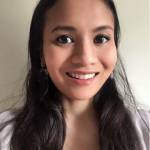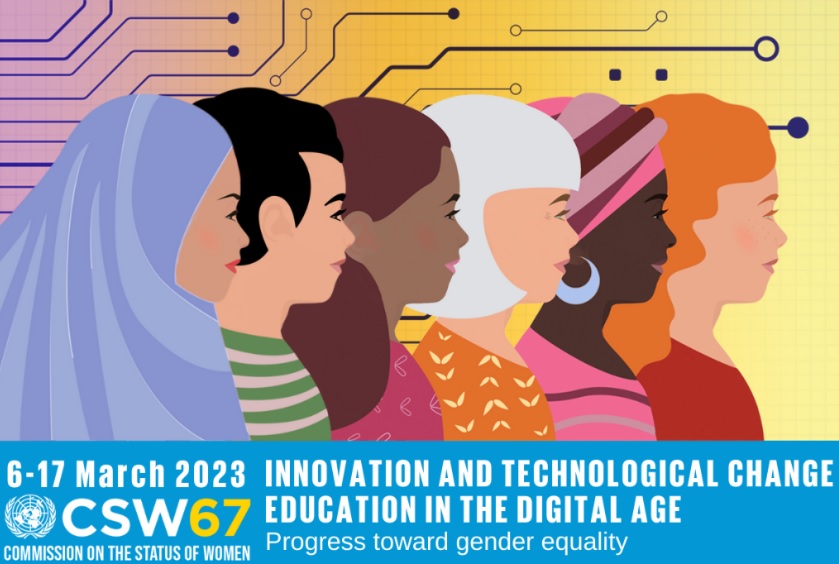

The United Nations 67th Commission on the Status of Women (CSW67) was held from 6th to 17th March 2023. It is the only gathering convening intergovernmental and non-governmental/ non-profit organisations that discuss the current status of women globally as well as sharing best practices on advancing gender equality and women empowerment. CSW serves three core functions to promote women’s rights worldwide, to create a space for women to tell their stories and to create a blueprint to shape global laws and policies.
I was privileged to be selected as the UN Women UK delegate to CSW67. UN Women was founded in 2010 with the triple mandate of working with governments, societies, and supporting grassroots communities to further advance gender equality and women empowerment. As a UN Women UK delegate, I attended plenary sessions as well as parallel or side events organised by non-governmental/non-profit organisations.
This year’s CSW67 priority theme was “Innovation and technological change, and education in the digital age for achieving gender equality and the empowerment of all women and girls.” We are still 300 years from achieving gender equality. Unfortunately, women at fourteen times more likely to die in a natural disaster. 435 million women and girls earn less than $1.90 per day worldwide by 2021 including the 47 million directly impoverished by the COVID-19 pandemic. 15 million girls will never learn to read or write.
The advent of technology has the potential to mitigate some of these issues faced by women and girls however it was also acknowledged that there are significant barriers faced by women and girls to experience the full benefits of technology so much so that technology itself could enlarge the gender inequality gap. Women and girls worldwide are less likely to use digital tools in their personal lives, education or in business. As our daily lives become digitalised, women and girls will be left behind if nothing was done to ensure that they too could capitalise on the available technology. The COVID-19 pandemic highlighted already existing gaps between men and women. Education in poorer communities worldwide is deprioritised for girls and this was even more so during the pandemic when girls could not participate in online learning due to the care burden. Today, the absolute gender gap between men and women’s access to technology has increased by 20 million since 2019. Excluding women and girls from digital spaces had cost low- and middle-income countries up to $1 trillion off their GDP.
During a plenary session of CSW67, I was reassured by the initiatives and progress made by many countries. Panama had transformed their national digital strategy for rural and indigenous women and introduced a business platform for women with changes to public policy regarding education especially in the early years. Panama was proud to announce that it was chosen as the headquarters of the World Robotics Olympiad 2023. Namibia emphasised that its constitution outlaws discrimination on the basis of sex, and its global alliance to protect children from sexual abuse and exploitation. Timor Leste provides gender-based violence training to journalists, organises programmes for rural women in ICT by educating these women on technology through mobile phones and digital marketing through social media and has scholarships for STEM. Importantly, Burundi reiterates that we cannot turn a blind eye to the fact that technology can be a source of hostility and abuse to women and children. Online spaces can be dangerous for women and girls – they may experience hate speech, gendered misinformation, misinformation, and be prone to grooming sites and be victims of deepfakes and scammers. Therefore, in empowering women in digital spaces, we must also empower women to recognise the pitfalls of technology, abusers of technology and the right course of action should one face abuse.
My interest in reproductive health saw me attending the parallel event on Going Digital: Improving Sexual and Reproductive Health Rights and Services for Women and Youth. I agree that sexual reproductive health rights should include a discussion about artificial reproductive technology (ART) to help couples decide if and when to have children. Social attitudes toward ART vary across Asia, and social stigma has decreased. More than 5000 IVF clinics across Asia, with China having approximately 1000 clinics, so there is an unequal distribution and access. There is a multitude of barriers to accessing ART, especially for LGBTQI, low-income, low-education groups. Many are unaware of tools in reproductive technology and there is a lack of access and rights with obsolete laws. For example, in Thailand, only heterosexuals can access surrogacy.
ART is largely unregulated as laws focus on clinical applications rather than the ethics of using human genetic materials. This made me reflect on India’s “rent-a-womb” industry. Since 2022, India has laws banning commercial surrogacy which prohibits surrogates from receiving monetary compensation except for medical and insurance coverage in a bid to prevent further exploitation of women from lower socioeconomic income groups. However non-governmental groups are concerned this would push surrogacy underground. There were also concerns that India’s Assisted Reproductive Technology Act will create further barriers for couples from low-income groups. Additionally, in India, ART is only available to heteronormative couples and single women (widowed/ divorced). In Malaysia, where I am from, there are no specific laws or regulations for ART, however, guidelines are produced by the Ministry of Health and Malaysian Medical Council which stipulated that ART can only be done in general hospitals or specialised centres. The National Council of Islamic Religious Affairs had issued a fatwa prohibiting surrogacy for Muslims – but I digress.
The overturned of Roe versus Wade in the USA is another worrying trend that was discussed during this session. However, there is also reassuring news regarding abortion care for women worldwide, with the landmark legalisation of abortion in Argentina and the use of teleconsultation through phone calls and WhatsApp for abortion. The success of teleconsultation for abortion was supported by a Lancet study which showed that “self-managed medication abortion with accompaniment group support is highly effective and for pregnancies less than 9 weeks gestation, is non-inferior to the effectiveness of clinician-managed medication abortion administered in a clinical setting”.
There was a sound commitment from African governments to end FGM (female genital mutilation) and child marriage during the “Harmful practices: catalyzing innovation to end female genital mutilation and child marriage.” However, as an advocate of ending FGM in Malaysia, I was disappointed to hear little to nothing about the current situation regarding FGM and child marriage in Southeast Asia and Malaysia.
Finally, one of the side events that struck me most was an event by Career Girls, a non-profit organisation that aims to provide girls around the world access to role models and diverse career choices. Only 22% of Africa has access to the internet, and internet access is expensive. Therefore, solutions to ensuring access to education must not be dependent on internet connectivity or the power grid. Career Girls employed the Rachel Plus (Remote Area Community Hotspot for Education and Learning) by World Possible, to allow students in areas of poor internet connectivity to access Career Girls website and online tools offline. Rachel Plus has 500 GB storage, has 5 hours plus battery life and allows 20-50 users on its platform which updates if plugged into the internet. I am inspired by how this technology had mitigated the connectivity issues faced by students in rural areas and allow them the same educational opportunities as their urban and richer counterparts.
Overall, CSW67 has been an enlightening and educational experience for me. There are many other sessions that I wished I had the opportunity to attend if not for the time difference and my clinical workload. It was a great opportunity to not only learn from the sessions but to also network with like-minded individuals and experts.
More from Dr. Hannah Nazri here.
BCPHR.org was designed by ComputerAlly.com.
Visit BCPHR‘s publisher, the Boston Congress of Public Health (BCPH).
Email [email protected] for more information.
Click below to make a tax-deductible donation supporting the educational initiatives of the Boston Congress of Public Health, publisher of BCPHR.![]()
© 2025-2026 Boston Congress of Public Health (BCPHR): An Academic, Peer-Reviewed Journal
All Boston Congress of Public Health (BCPH) branding and content, including logos, program and award names, and materials, are the property of BCPH and trademarked as such. BCPHR articles are published under Open Access license CC BY. All BCPHR branding falls under BCPH.
Use of BCPH content requires explicit, written permission.